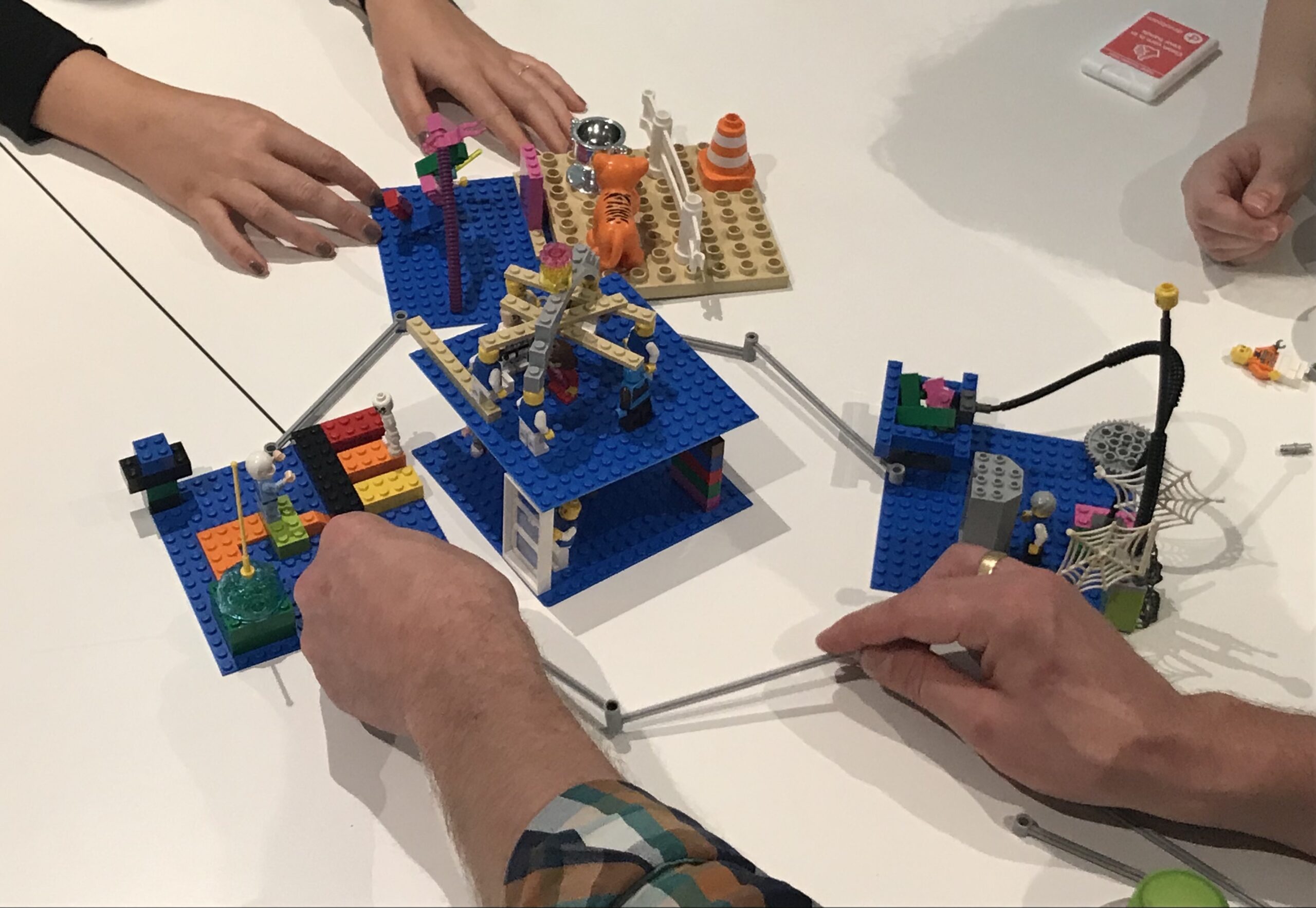Our Foundational Certification is the choice for anyone who wants a solid foundation in the LEGO® SERIOUS PLAY® method; preserving the power of the original methods but adapted to modern organisational challenges.
The methods taught in the Foundational Certification have been tried, tested and refined through over 2.000 workshops delivered worldwide, to ensure that the workshop tools you leave this training with aren’t just versatile but also highly effective at addressing organisational challenges.
Read much more about the LSP method here »

As a trained facilitator in the LEGO® SERIOUS PLAY® methodology you can:
- Design workshops that are adapted to your own organisational context.
- Deliver impactful workshops that are as short as 1 hr!
- Facilitate teams of any size.
- Use a versatile, flexible workshop format that you can adapt to any organisational context.
The content of the Foundational Certification
Day 1
Theory & History:
Understanding the history and theory gives you a solid foundation when adapting the generic tools to your specific organisational context.
- What is LEGO® SERIOUS PLAY® (LSP)?
- The history and development of the method.
- How and when to use LEGO® SERIOUS PLAY®.
- Understanding the aspects of creative knowledge systems.
- Understanding the core elements of the method: Construction – Metaphors – Story making – Imagination.
- The core processes of the original methodology.
- The Real Time concept.
- The code of conduct of the methodology, the facilitator, and the participants.
Skills-building:
These are shorter exercises that can be used either as warm-up exercises or as exercises in very short workshops:
- The skills-building toolbox – making the core elements come alive.
- Focused exercises on the basic elements in the methodology.
- Construction of knowledge with LEGO® bricks.
- Knowledge of how metaphors can help you communicate complex ideas and knowledge.
- Storytelling and its ability to help you discover, explore and make decisions.
- Imagination is a powerful source of new ideas.
- The concept of play, and how it allows us to experiment and explore things in new ways.
- How to develop and run smaller workshops.
Day 2
Core application:
We will introduce and train the 6 steps in creating a core application of the LEGO® SERIOUS PLAY® method that can be used for infinite purposes. At the end of the session, we will discuss how to develop, plan and run a tailormade application.
Model separately and together
We set up a task to uncover the substance of the subject, e.g. the strategy, the team, the ability to innovate, etc. from different orientations – each participant builds their models, tells about them and then the group brings them together in shared models based on the instructions. Learn how to facilitate the individual building of models and how to guide teams to bring these together into shared models.
Ecosystem and factors
The ecosystem – e.g. the team, the company, the project, the strategy, or the ability to innovate – is created out of the shared models. To see what affects the systems and how, participants build the full landscape, e.g. stakeholders, team dynamics, trends, or other actors.
Correlations in the ecosystem
Dependencies and correlations in the ecosystem are illustrated through connections on the table. This is a way to embrace complexity, both internally and externally, as well as a space where conflicting perspectives can exist simultaneously, as they do in every day organisational life.
Learnings & Actions
We identify conclusions, principles, and actions based on the knowledge we have about the ecosystem right now.
Our certification schedule
| Location | Date | Language | Trainer | Details |
|---|---|---|---|---|
| UK, Durham | 10–11 November 2025 | English | Janine Chandler | Get Details |
| UAE, Dubai | 15–16 November 2025 | English | Nataliya Wiedemeyer | Get Details |
| Czechia, Prague | 27–28 November 2025 | English | Leonid Kushnir | Get Details |
| Slovakia, Bratislava | 1–2 January 2026 | Czech | Leonid Kushnir | Get Details |
| Israel, Hertzelia | 7–8 January 2026 | Hebrew | Tchia A. Altar | Get Details |
| UK, Central London | 11–12 February 2026 | English | Penny Bradshaw | Get Details |
| Bulgaria, Sofia | 11–12 February 2026 | Bulgarian | Tzvetelina Teneva | Get Details |
| Czechia, Prague | 12–13 February 2026 | Czech | Leonid Kushnir | Get Details |
| Sweden, Stockholm | 5–6 February 2026 | English | Carol Hill / Morten Brøgger | Get Details |
| Norway, Oslo | 30–31 March 2026 | English | Carol Hill / Morten Brøgger | Get Details |
| Finland, Helsinki | 4–5 March 2026 | English | Carol Hill / Morten Brøgger | Get Details |
| Denmark, Copenhagen | 22–23 June 2026 | English | Carol Hill / Morten Brøgger | Get Details |

